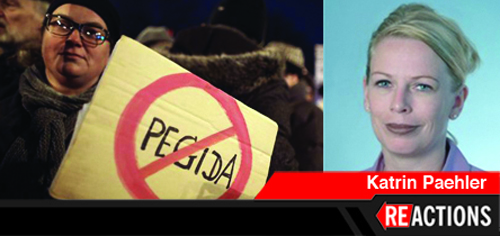Protests from the German group Pegida (Patriotic Europeans Against the Islamization of the West or Patriotische Europäer gegen die Islamisierung des Abendlandes), formed in Dresden, have grabbed international headlines for their anti-foreigner and anti-Islam rhetoric. People are quick to tie Pegida to the Neo-Nazi movement. Yet Associate Professor of History Katrin Paehler says the message is not only in the protests of Pegida, but also in the reaction of the majority of the German people.
Paehler:
Germans of a certain age group have a tendency to see Nazis hidden under every stone. I certainly belong to that group. Alas, having lived abroad for going on 20 years – all those years in the U.S.– I’m perhaps a bit more optimistic than your standard-issue German. I think that is the reason my concerns about Pegida are coupled with a happiness about the counter-demonstrations against the group. It represents a broad, societal consensus that Pegida’s standpoints are not acceptable.
When a few hundred show up for the Pegida demonstrations, a few thousand come the next day for the counter-demonstrations. When the group tried to gather for a protest outside the cathedral in Cologne, the archbishop simply turned off the lights of the massive church. The group was plunged into darkness, and most just headed home. Now Cologne is certainly a Catholic stronghold. As a leftist feminist, I do not have all that much in common with the archbishop and I think that left to our own devices, we would get into a bit of an argument. Yet, we are part of the same center when it comes to our rejection of Pegida’s nonsense. And that makes me feel hopeful.
Many people want to tie Pegida to the rise of the Nazis in Germany in the 1920s and 30s, and there are some similarities. Nazism tapped into a similar discontent with modernity, democracy and capitalism and offered easy answers to complicated questions. Even some of the language is similar – accusing the media of being a “lying press,” and speaking about the inadequacies of the “the system.” Yet the Weimar Republic fell, not simply because of Nazism’s attack, but because the political center did not hold.
In the 1990s, during German reunification, there were arson attacks and riots against foreigners. There were debates among the German intelligentsia about how to define German identity. There were right-wing notions then, but – as one author put it – “the centre held.” There was a question for a time if that center – democratic, enlightened, moderate, pacifist to a fault– would hold. It did, but there was a struggle.
Now there is little question. The German chancellor comes out and calls the people of Pegida cold-blooded with hate in their hearts. People turn out in the thousands to say an unequivocal “no” to the hatred Pegida spews.
Paehler can be reached through MediaRelations@IllinoisState.edu.

